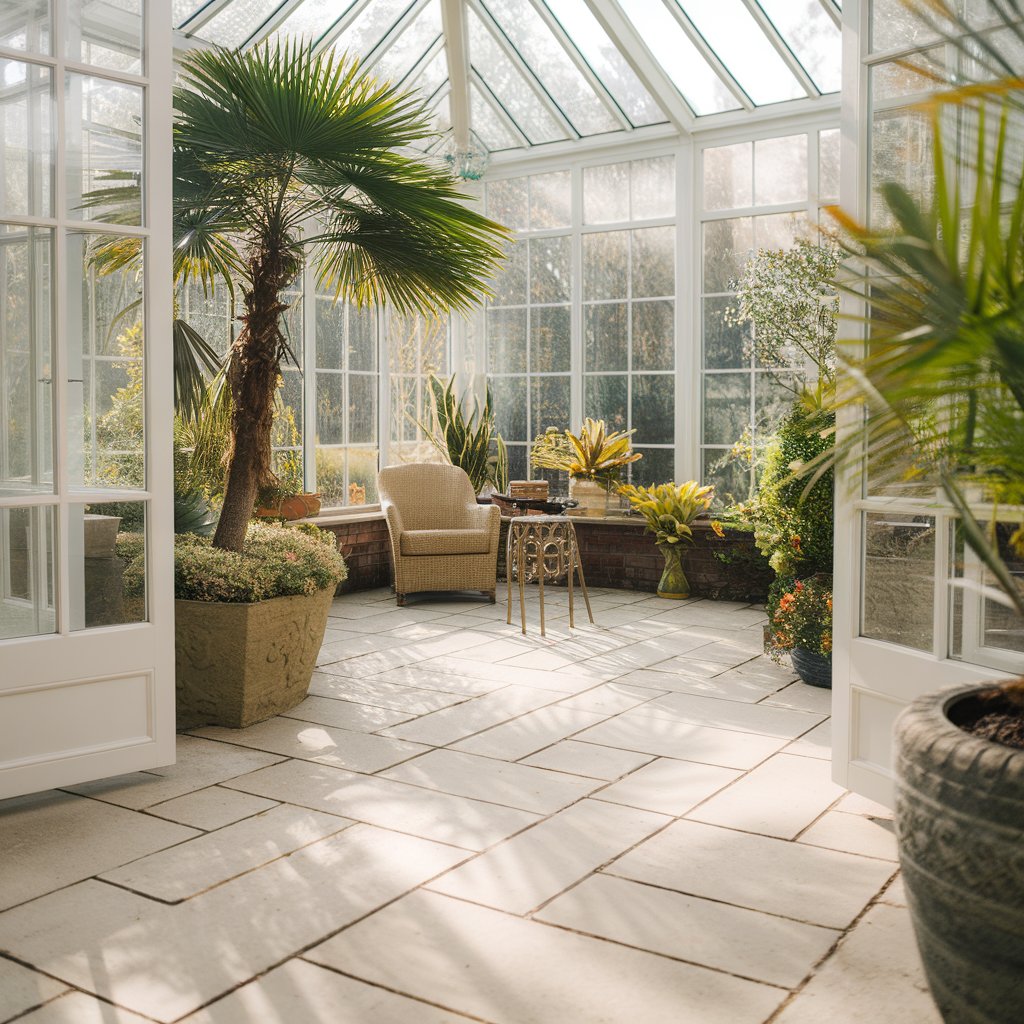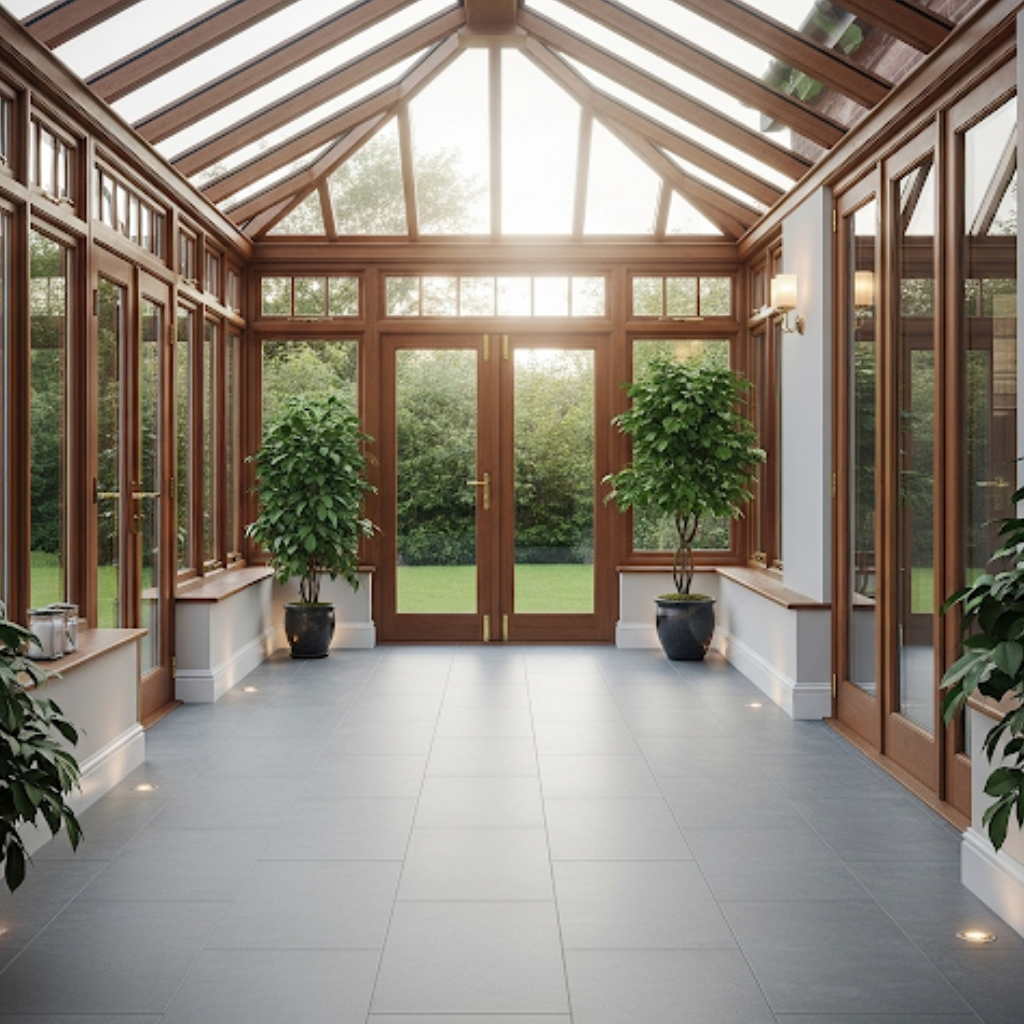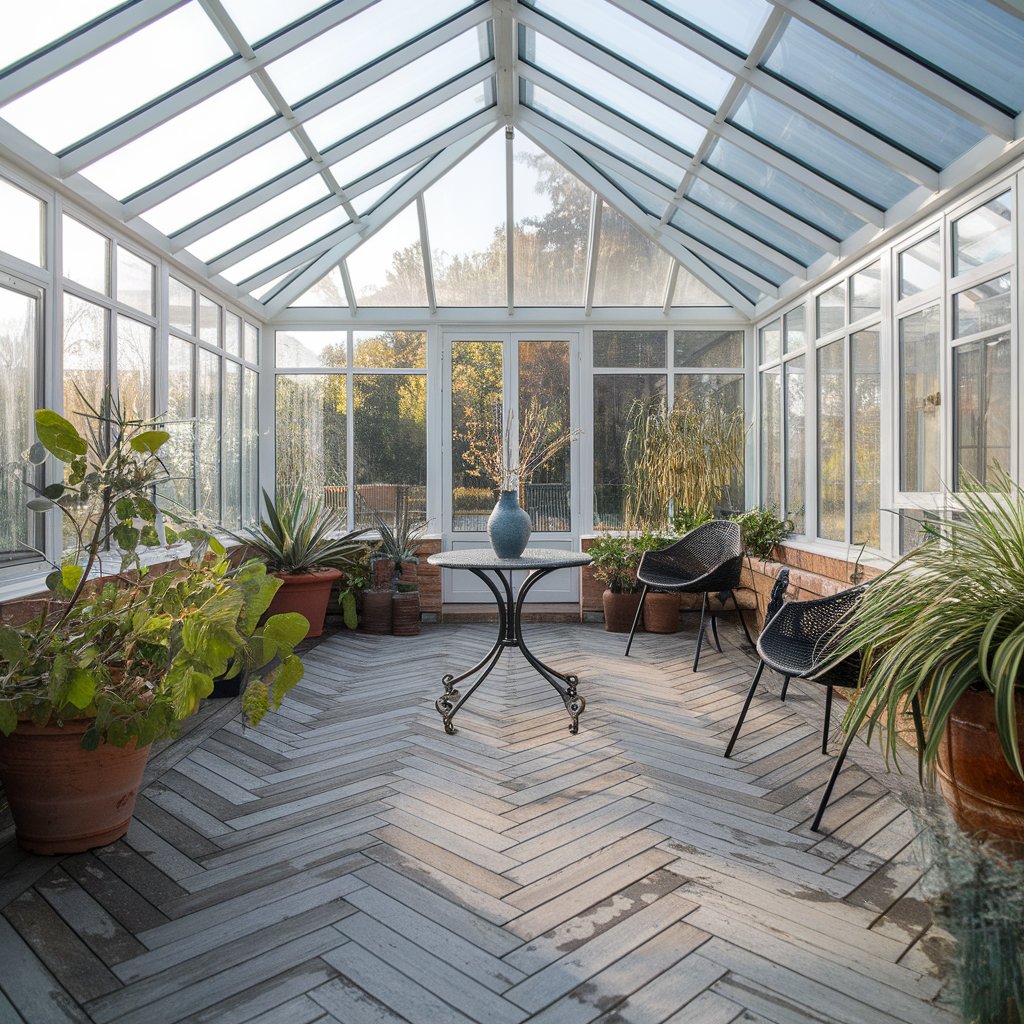When choosing flooring like waterproof options for your conservatory, consider the best vinyl flooring for its adaptability and temperature regulation. It provides superior UV protection, preventing fading and damage from sun exposure. Alternatively, tile flooring offers durability and water resistance, making it ideal for moisture-prone areas. Real wood adds warmth and appeal with UV protection, though it's less suitable for high-humidity environments. For a tailored choice that maximises durability and aesthetic appeal, it's essential to choose the perfect flooring for your conservatory, exploring further options among the popular flooring choices.
When picking the best flooring for your conservatory, you'll want to consider several factors, like temperature changes and foot traffic.
Comparing laminate and vinyl options can help you find a balance between style and practicality.
Understanding the durability of each material ensures your choice stands the test of time.
While choosing the best flooring for your conservatory, consider factors like durability, temperature regulation, and aesthetic appeal.
Your conservatory floor needs to withstand temperature changes and resist UV rays. Opt for a waterproof flooring option to handle spills and humidity, ensuring long-lasting use. By selecting materials that manage both heat and cold, you create a welcoming space for year-round enjoyment.
Durability is crucial, so pick a flooring option that can endure daily wear and tear while maintaining its charm.
You want a space that feels like an extension of your home, where you and your loved ones can gather comfortably. With the right conservatory floor, you'll have a beautiful, functional area that truly belongs to your home.

How do you decide between options like laminate and vinyl flooring for your conservatory? Start by considering what you truly need. Both options, like laminate or vinyl, offer water-resistant features, making them suitable for high-moisture areas. Vinyl flooring stands out with its superior UV protection, ideal if your conservatory is sun-drenched. Laminate floors, however, provide a more natural look and feel, making them an excellent covering choice if you want a wood-like appearance with easy maintenance.
Here's a quick comparison:
| Feature | Laminate Floor | Vinyl Flooring |
|---|---|---|
| Water-Resistant | Yes | Yes |
| UV Protection | Limited | Superior |
| Moisture and Temperature | Sensitive | Stable |
| Easy to Clean | Yes | Yes |
Ultimately, your choice hinges on your conservatory's exposure to sunlight and your personal style preference. Whichever you choose, you'll enhance your space, creating a welcoming haven for family and friends.
Choosing the best flooring for your conservatory requires a keen understanding of material durability, as each option offers different strengths and weaknesses.
You want available flooring that withstands moisture and temperature changes while creating a welcoming space for everyone. Vinyl flooring is a great choice, often considered the best flooring for conservatories due to its resilience and adaptability.
It copes well with fluctuating conditions and complements underfloor heating, ensuring your conservatory remains cosy year-round. Additionally, hard-wearing types of flooring like tile or stone can offer durability, though they may require more maintenance.
Whatever you choose, ensuring your flooring is one that is both practical and inviting will help your conservatory become a cherished part of your home, where memories are made and shared.
To install conservatory flooring successfully, start by preparing your floor to ensure a smooth and even base.
For vinyl, follow specific steps to secure the material without bubbles or gaps, while engineered wood requires precise measurements and alignment.
Use these tips to transform your conservatory into a stylish and comfortable space with a well-installed floor. Conservatories are usually exposed to fluctuating temperatures, so choosing a durable material is key. With the right approach, you can add elegance to your conservatory and functionality, ensuring you find the perfect flooring solution for your space.
Installing vinyl flooring in your conservatory can be a straightforward process if you follow the proper steps.
First, choose a luxury vinyl flooring type suitable for your space. It should be compatible with underfloor heating, ensuring comfort during colder months.
Before starting, make sure your subfloor is clean, dry, and level, as this will help the vinyl adhere properly.
Next, acclimate the vinyl planks to your conservatory's temperature and moisture levels by leaving them in the room for 48 hours.
Begin installing conservatory flooring by laying the planks in a staggered pattern, ensuring a natural look and stability.
Secure each plank snugly, and use a sharp utility knife for precise cuts.
With these steps, you'll create a beautiful, durable floor that brings everyone together. Whether you choose flooring like vinyl or laminate, both can provide long-lasting results when installed properly.
When installing engineered wood flooring in your conservatory, it's crucial to plan meticulously to ensure a flawless finish.
Start by considering the flooring choice, as engineered wood is a type that's perfect for handling temperature changes and moisture. Remember, the conservatory environment can vary, so choosing flooring that withstands these conditions is essential. Unlike solid and engineered wood, engineered wood is more stable in fluctuating temperatures, which helps prevent the flooring from warping.
A key installation tip is to acclimate the flooring materials to your conservatory's climate before laying them. This helps prevent warping or gaps due to temperature fluctuations.
Additionally, leave a small expansion gap around the edges to accommodate any movement.
Factors to consider include the layout of your space and the direction of natural light, as these can impact the visual appeal.
If you want a flooring option that's both beautiful and functional, engineered wood provides a durable, stylish solution for your conservatory. With careful planning, you'll achieve an attractive, durable floor.
Before laying down your conservatory flooring, it's crucial to prepare the subfloor properly to ensure a smooth installation. Start by clearing the area of any debris, ensuring that your conservatory floor is clean and dry. This step is vital to avoid bumps or moisture issues later.
Next, inspect your subfloor for any damage; repair cracks or uneven spots to create a solid foundation for the best flooring. Consider using a moisture barrier to protect against dampness, especially if your conservatory is exposed to the elements.
Once your floor is prepped, you're ready to install a flooring option that enhances the beauty and functionality of your space. Whether you want a more natural look or a durable, water-resistant choice, selecting the right choice for conservatory flooring will make all the difference. By taking the time to prepare, you're not just installing flooring for conservatories; you're creating a welcoming haven. Many materials commonly used in conservatories provide a perfect blend of style and practicality.
You'll find that vinyl flooring offers several advantages for conservatories, making it a practical choice.
It manages temperature changes effectively, ensuring your space remains comfortable throughout the year.
Plus, with easy maintenance tips, keeping your vinyl or laminate flooring looking great is a breeze.

Opting for luxury vinyl flooring in your conservatory offers a blend of practicality and style that's hard to beat. Vinyl tile, also known as LVT flooring, is ideal for conservatories due to its durability and resistance to the elements. It's a great choice because it's easier to maintain, even with extended exposure to UV rays. You want a space where friends and family feel welcome, and LVT creates that inviting atmosphere effortlessly.
| Benefits | Description |
|---|---|
| Durability | Resists wear and tear |
| UV Resistance | Withstands sun exposure |
| Maintenance | Simple to clean and maintain |
| Aesthetic Appeal | Mimics natural materials beautifully |
| Comfort | Soft underfoot and warm |
Choosing luxury vinyl ensures your conservatory remains a cherished part of your home.
When the temperature fluctuates, vinyl tile proves to be an excellent choice for conservatories due to its impressive ability to maintain stability.
You want your conservatory areas to feel like a comfortable extension of your home, and choosing the right flooring is essential. Unlike other materials that may warp or expand, vinyl tile handles temperature changes with ease, ensuring your space remains inviting and cohesive.
Vinyl is a reliable option for conservatories, offering durability and style without the concerns associated with traditional materials.
Choosing laminate or vinyl flooring for conservatory areas ensures you make the most of your space, regardless of the weather outside.
Vinyl tile's resilience provides a sense of belonging, creating a warm, welcoming environment where you and your loved ones can gather and enjoy.
Although maintaining vinyl and laminate flooring in your conservatory is straightforward, a few tips can help you keep them looking their best.
With their waterproof properties and cost-effective appeal, these floors offer a variety of colours and finishes to fit your space perfectly.
To ensure your conservatory flooring remains in top condition, consider these maintenance tips:
Embrace these tips and enjoy your beautiful flooring!
If you're considering tile for your conservatory, you'll appreciate its durability and ease of maintenance.
Unlike solid wood, tile doesn't warp with humidity changes, making it a reliable choice for this sunlit space.
Plus, with various styles and colours available, you can seamlessly match your decor.
Tile flooring offers several compelling benefits for conservatories, making it a popular choice among homeowners.
If you're searching for the best conservatory flooring, tile is a fantastic option. It withstands foot traffic and won't warp under consistent sun exposure, a common issue with other materials. When looking its best, tile flooring maintains its appearance over time, even in high-traffic areas.—similar to those discussed in various hallway floor ideas, where durability and style are equally essential.
Tiles reflect natural light beautifully, creating a warm, inviting atmosphere in your conservatory. Plus, they come in various styles and colours, allowing you to express your unique taste.
When choosing between tile and solid wood for your conservatory flooring, it's essential to weigh the pros and cons of each.
Solid wood flooring adds warmth and a classic touch, making your conservatory feel like an extension of your home. However, it can be susceptible to moisture, so it may not be the best choice if you're seeking a waterproof conservatory floor.
On the other hand, tiles come in various styles and are highly durable. They're excellent for creating a cohesive, stylish space that can withstand the elements.
Ultimately, choosing the right flooring for a conservatory depends on your priorities. If you value durability and a waterproof option, tiles might be your best bet. For a more traditional feel, consider solid wood.
When you're considering real wood flooring for your conservatory, you'll find its durability is a significant advantage.
It stands up well to the wear and tear of daily use while offering a timeless aesthetic.
Plus, with proper UV protection, you can maintain its rich colour and prevent fading from sunlight exposure.

Although there are numerous flooring options for conservatories, solid wood flooring stands out for its exceptional durability. When you're choosing the right flooring, you want something that not only complements your space but also withstands the test of time.
Real wood flooring offers the best of both worlds—it's durable and enhances the aesthetic of your conservatory. Whether you're considering solid or engineered wood, it's essential to know why solid wood is a top choice for a waterproof conservatory floor.
If you're looking for the best flooring for sunny rooms, real wood is an excellent option thanks to its strength and resistance to sunlight damage.
If you're considering flooring options for your conservatory, real wood flooring is a top contender due to its UV protection capabilities.
Choosing between solid wood and engineered wood ensures your conservatory feels warm and inviting. Real wood not only adds elegance but also shields against harmful UV rays, which can fade surfaces over time. Hardwood flooring is made to withstand the sun, maintaining its beauty and longevity.
When selecting the flooring you choose, consider wood or engineered wood flooring for its resilience.
The natural charm of real wood creates a sense of belonging, making every visit to your conservatory a delightful experience. With the right finish, real wood flooring can endure the sun's effects, ensuring your space remains stunning for years to come.
In choosing the best flooring for your conservatory, consider factors like durability, water resistance, and style. Vinyl flooring offers an easy-to-clean surface with excellent waterproofing, making it a popular choice. Tiles provide a sleek, durable surface that can handle temperature changes. Real wood brings warmth and elegance but requires more maintenance. Whatever you choose, ensure proper installation to extend its life and performance. With the right flooring, your conservatory can become a beautiful, functional space you'll enjoy year-round.